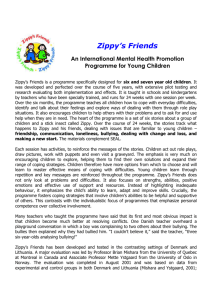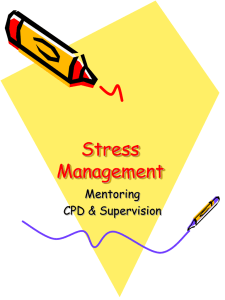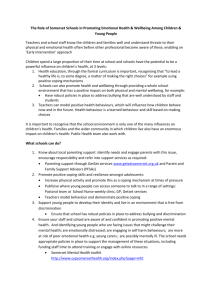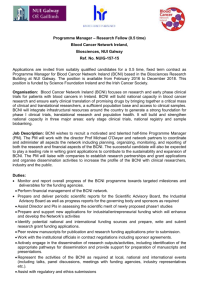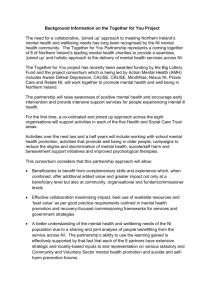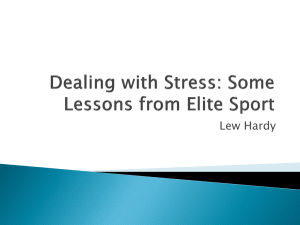Evaluation of Zippy`s Friends - National Office for Suicide Prevention
advertisement
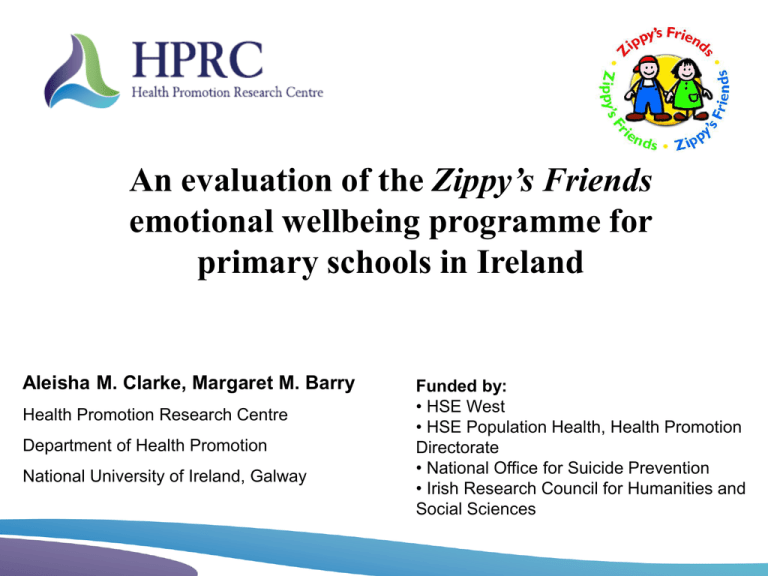
An evaluation of the Zippy’s Friends emotional wellbeing programme for primary schools in Ireland Aleisha M. Clarke, Margaret M. Barry Health Promotion Research Centre Department of Health Promotion National University of Ireland, Galway Funded by: • HSE West • HSE Population Health, Health Promotion Directorate • National Office for Suicide Prevention • Irish Research Council for Humanities and Social Sciences Evaluation of Zippy’s Friends in Ireland Aims To determine if an international evidence based programme could be adapted and successfully implemented in the local context of disadvantaged primary schools in Ireland To assess the impact of the programme on the pupils’ emotional and behavioural wellbeing and coping skills To examine the process of implementation and the relationship between this process and the programme outcomes Methodology Study Design: Randomised Controlled Design Donegal, Sligo, Leitrim & Galway DEIS Schools Data Collection T1: Baseline (Feb ’08) (n= 730) T2: Interim I (June ’08) Intervention Control (n= 523) (n=207) T3: Interim II (Oct ’08) T4: End of Prog (Apr ’09) Intervention Type I Intervention Type II (n=270) (n=253) T5: 1 Year Follow Up (Apr ’10) Programme Implementation Programme Fidelity Level of implementation: Modules 1-6 Intervention Type I Intervention Type II Fully Implemented 86.4% 86.6% Partially Implemented 7.2% 6.2% Not implemented 6.2% 7.2% Key Findings on Programme Effects Emotional Literacy Checklist N Pre- EL Score Post- EL Score 317 61.45 (11.36) 66.26 (11.54) Control 109 65.53 (10.91) 65.06 (10.16) Interv Key Findings on Programme Effects Children’s emotional literacy • • Findings from participatory workshops indicate children in intervention group had more elaborate and wider range of vocabulary for articulating their feelings Observed improvements in children’s social skills, verbal communication skills and ability to articulate their feelings Children’s coping skills • • Draw and Write activity indicate an increase in the use of problem solving coping strategies among children in the intervention group Children in the intervention group displayed wider repertoire of coping skills during participatory workshops Key Findings on Programme Effects Children’s emotional and behavioural functioning • Significant decrease in intervention group’s hyperactivity levels as measured by the Strengths and Difficulties Questionnaire Children’s relationship with each other • • • Better able to communicate More likely to look our for each other Sort out minor incidents themselves - reduced problems out in yard Children with emotional difficulties • • Positive effect on children with anger management problems Introverted children more confident in circle Effects of the Programme on the Teacher Improved Awareness • How the children feel • Impact of teacher on the children’s feelings Strategies • Strategies to work with the children and their problems Child-Teacher Relationship • “Hour of closeness” Programme Implementation: Facilitating Factors Barriers • Circle • Time, overall busyness of school day • Personal Experience • Multi-grade classes • Prepared • Training • Consistency Feedback from teachers SPHE • • Supports delivery of SPHE strands and strand units Structured comprehensive resource Whole School Approach • • • All teachers need to be made aware of programme and strategies taught Programme could be taught at different levels throughout the school Children in fourth class able to apply strategies to own lives Parental Involvement • • • Programme needs to be reinforced at home Feedback sheet send home with exercise on it Adult version of Zippy’s Friends for parents Summary of main findings • Successful programme adaptation to Irish designated disadvantaged primary schools • Significant positive effects on children’s emotional literacy, coping skills, hyperactivity and teachers’ relationships with the children Previous and current international evaluations of Zippy’s Friends • Lithuania and Denmark (Mishara & Ystgaard, 2006) • Southampton, (Holmes & Faupel, 2003, 2004) • Norway (Ystgaard, M.) • Canada (Mishara, B.L.) 12 month follow up study in Ireland • Long term effects of the programme on children’s emotional and behavioural wellbeing • Academic achievement scores A copy of the full report is available to download at: http://www.nuigalway.ie/hprc
